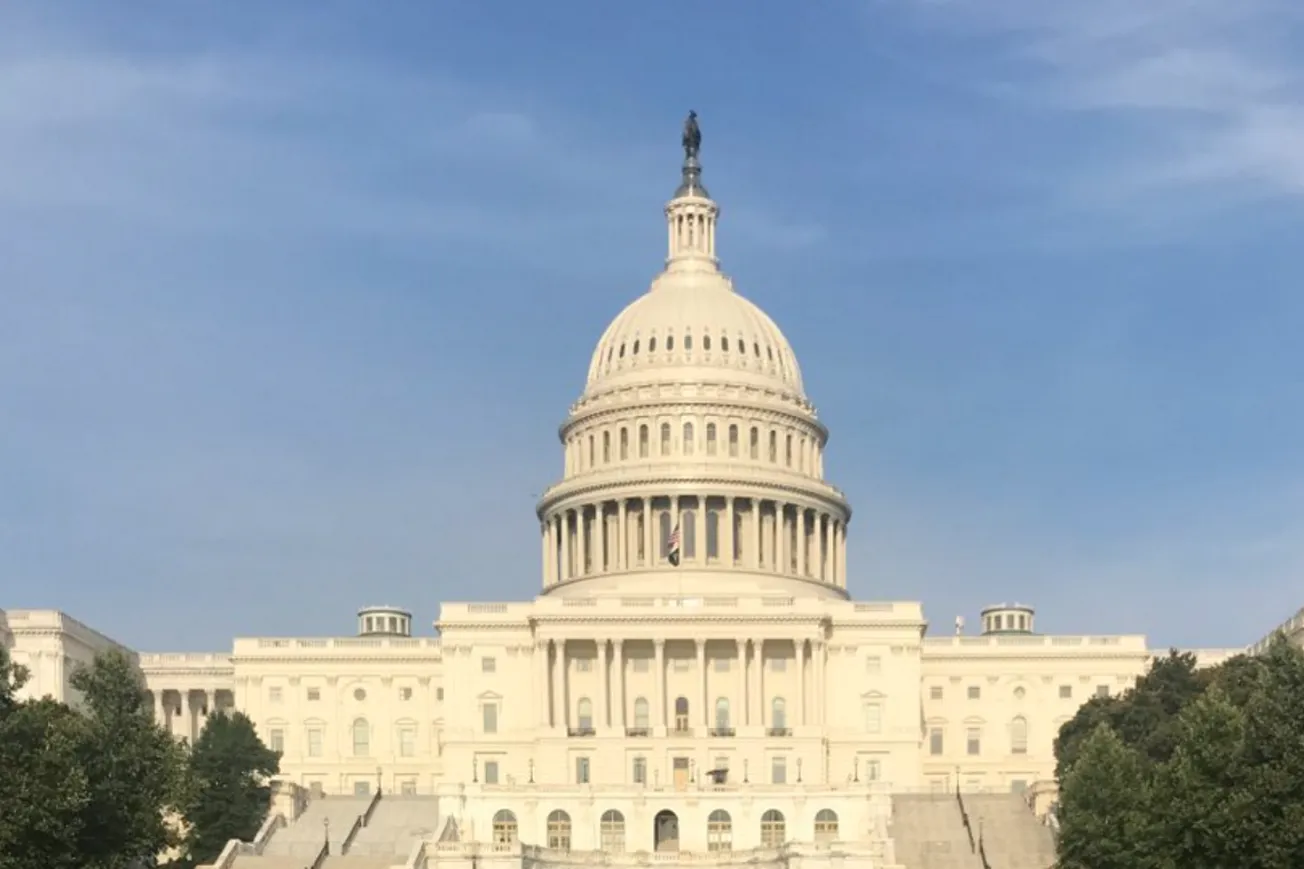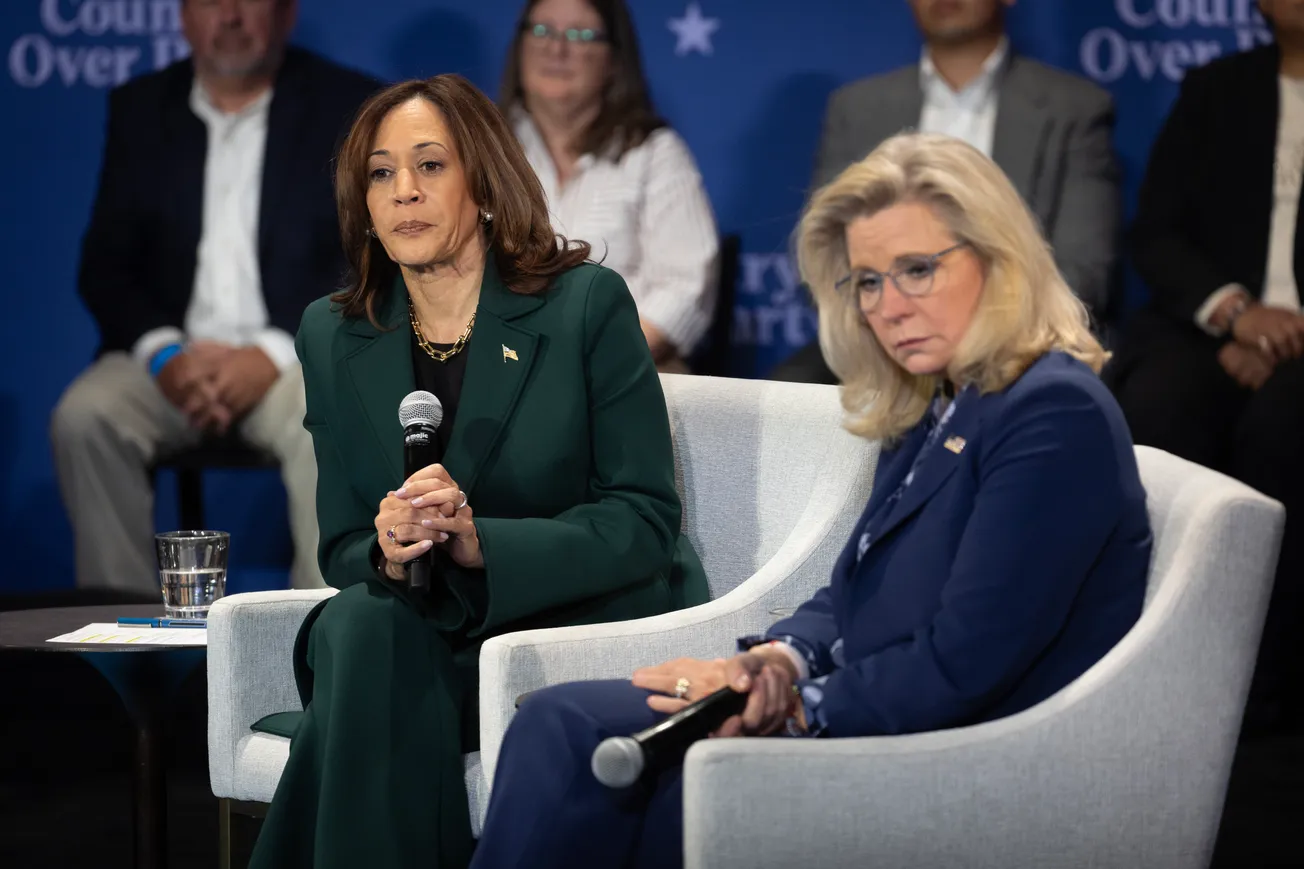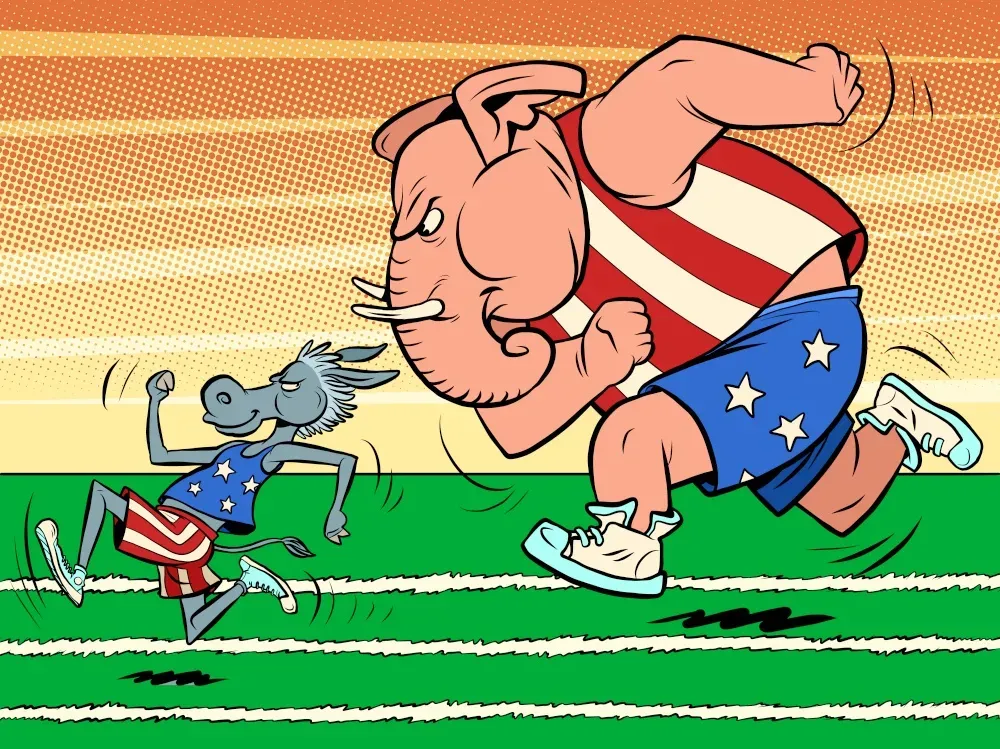Despite both major parties claiming they have an advantage, the race for control of Congress appears to be a dead heat, the most recent I&I/TIPP data show. But there’s a big potential surprise element that could tilt the balance sharply: Nearly one out of every seven registered voters, or 15%, are “not sure” whom they’ll vote for.
The online poll of 1,158 voters across the country was taken from October 5-7, with a margin of error of +/- 2.9 points.
The poll asked those responding: “What is your preference for the outcome of this November’s congressional elections?”
Answers showed the sharp division among the electorate, with 42% saying they would prefer “a Congress controlled by Republicans,” and 43% saying they preferred “a Congress controlled by Democrats.” The results are within the poll’s margin of error of 2.9 percentage points.
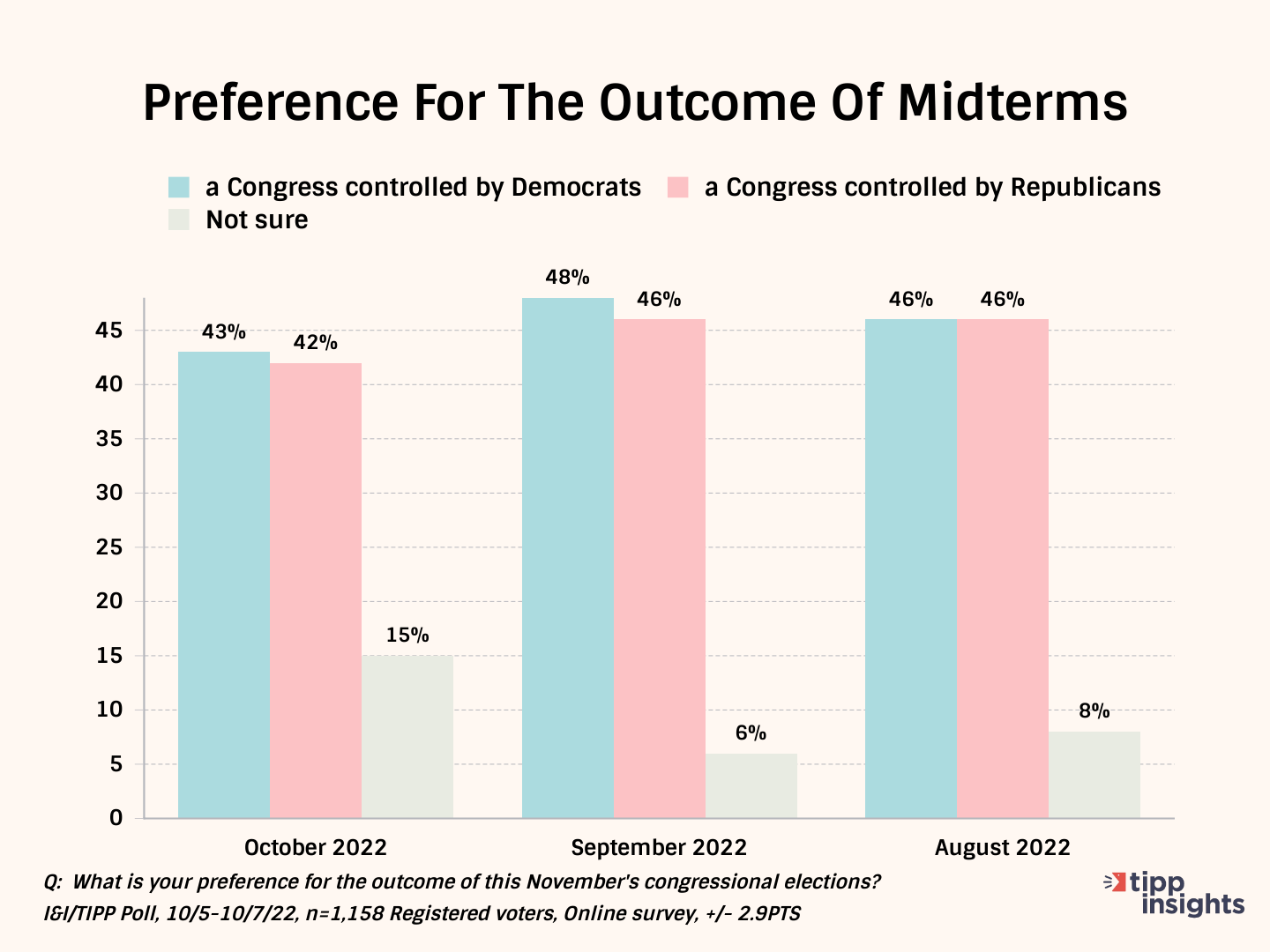
Breaking it down by party, 84% of Democrats said they wanted their party to maintain control. For Republicans, the share was even larger for their own party: 90%.
But here’s where it gets interesting: 10% of Democrats say they want Republicans to have control, versus just 5% of Republicans saying they would prefer Democrats. The wild card in this hand are the independents: 31% preferred Republicans, versus 30% who preferred the Democrats.
That’s only 61%. What about the rest? 39%, a huge share of the independents, say they’re “not sure.” The comparable number for both Democrats and the GOP is 6%.
In short, the 39% of independents who are uncertain is a key battleground for both parties over the next two weeks. The party with the greatest success in gaining uncommitted independents will almost certainly control Congress.
Historically, “undecided” voters tend to break against the incumbents in favor of challengers. They are “undecided” because they are skeptical about the incumbent.
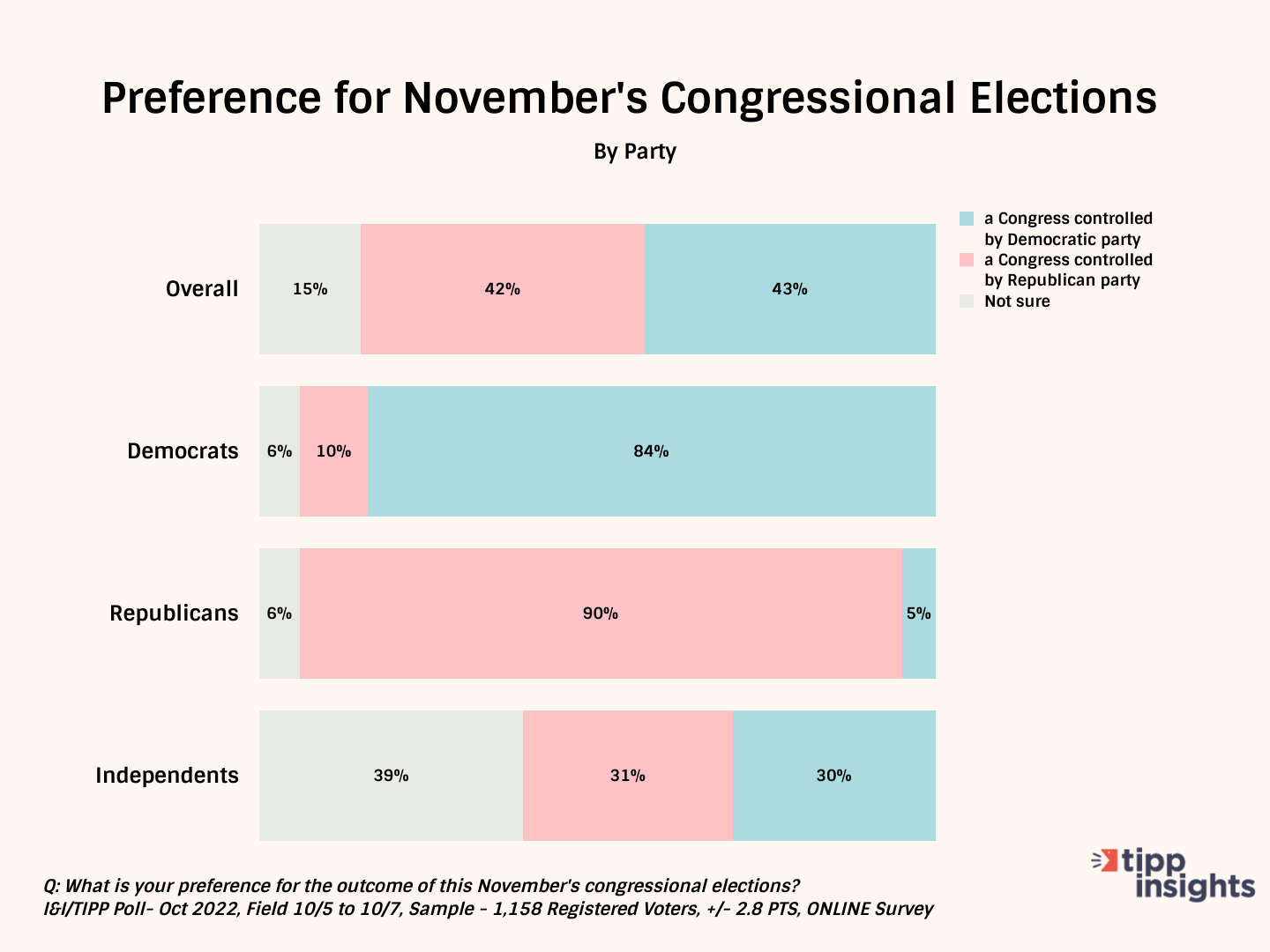
As a companion question, the I&I/TIPP Poll asked the following: “In general, do you believe that elected officials in Washington represent mostly the views and values of …”
They were then given four possible responses: “Their constituents,” “Big donors,” Extremists in their party,” and “Not sure.”
In what perhaps might be called a disappointing referendum on the Congress, just 22% said elected officials represented mostly their views and values. A hefty 39% responded “big donors,” while another 23% said “extremists in their party.”
“Not sure” garnered 17%.
The political breakdown of the responses was likewise enlightening. Among Democrats, 34% answered “constituents,” while 35% said big donors and 20% said extremists. Of those, 16% were “not sure.”
For Republicans, just 15% said their congressman primarily represented constituents. A sizable chunk, 43%, said big donors are favored, while 31% said party “extremists” are the priority.
Again, independents were the extreme: Only 11% said constituents were represented, 40% said big donors, and 24% said extremist elements of the party. But a large 25% said they weren’t sure.
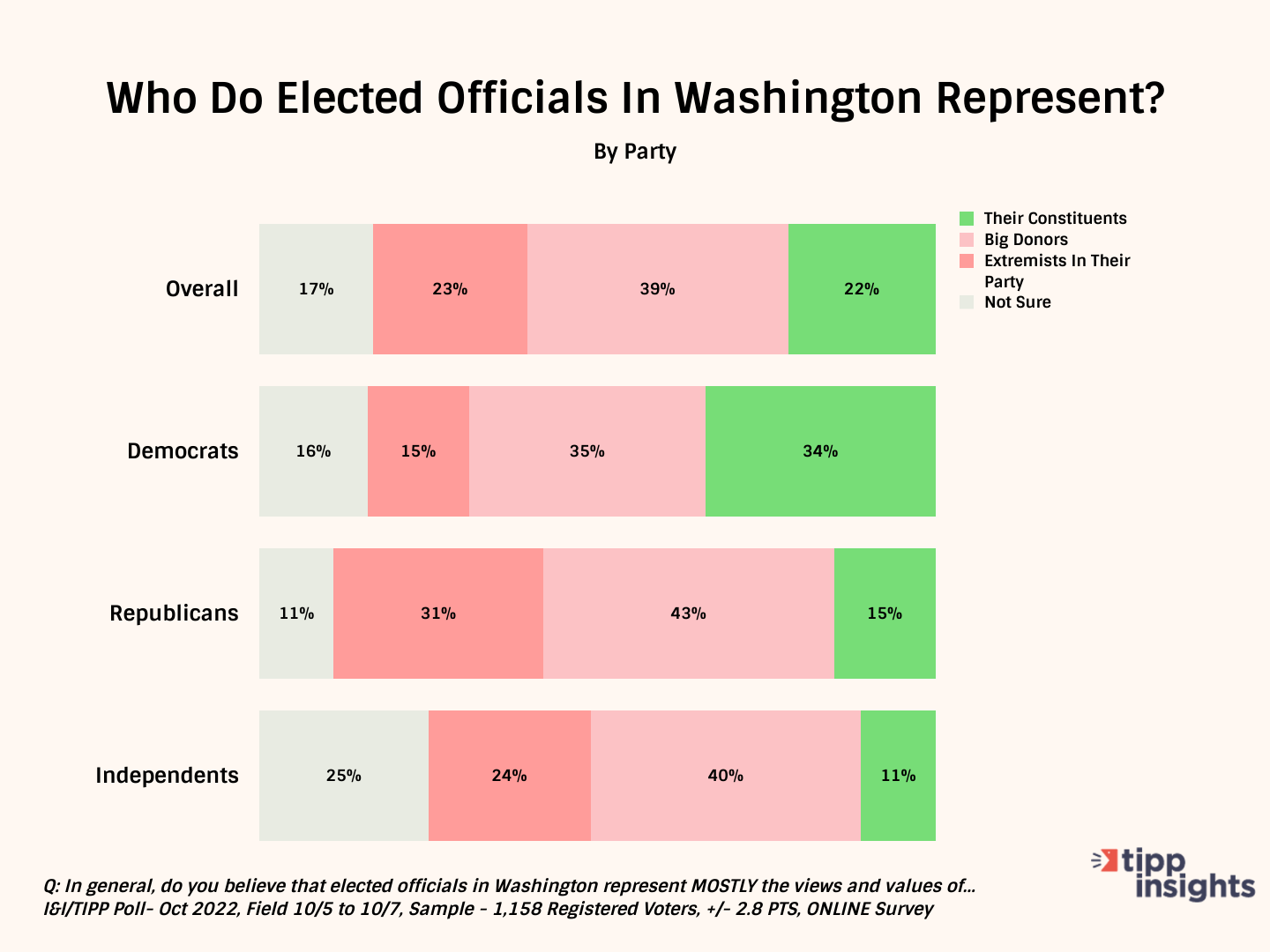
A picture of the coming election emerges: Partisans of both major parties have fairly solid convictions and are likely to vote accordingly. It is the independent vote, the swing vote, that will decide the election.
How big are the self-described independents, and how will they vote?
The Gallup polling organization has kept a running tally over the years of party affiliation. Independents now are the biggest “political” group in America. At 43% of the total voting population, they represent a de facto unorganized third major political party.
As of now, just 20% of those Gallup tracks consider themselves Democrats, while 30% say they’re Republicans.
How will those independents vote? The Gallup data show that roughly 48% lean Republican, while 44% lean Democrat, a finding in keeping with TIPP’s own data on voter preferences.
“Make no mistake: independent voters are alive and well, and they’re angrier than ever,” wrote Tony Woodlief, executive vice president of the State Policy Network, in a piece late last year that remains relevant today. “They’ve endured vaccine mandates, school shutdowns, and forced masking of toddlers. School board recall attempts have risen four-fold this year. Voters want pragmatists, not partisans.”
If so, that could be very bad news for Democrats on Nov. 8, as evidenced by yet another poll.
The Harvard-Harris Poll asked voters what the most important issues facing Americans today are. Among the top three responses, “Price increases/inflation” was No. 1 at 37%, followed by “economy and jobs” (29%) and “immigration” (23%).
How does that match voters’ perceptions of what Republican and Democratic leaders are concerned with?
The data show the major parties far apart on 27 major issues — and that Democrats also diverge from average Americans’ concerns.
Voters in the Harvard-Harris poll said Republican leaders were most concerned with the same three major issues as they were: immigration (37%), inflation (24%), and economy and jobs (21%).
Democrats? Not so much. Voters thought they were mostly preoccupied with Jan. 6 (27%), women’s rights (25%), and the environment/climate change (23%).
Taken with the recent I&I/TIPP Poll, this suggests rough going for Democrats in November. For example, recent news stories highlight independent women voters moving strongly toward the GOP, while voters increasingly warm to the idea of a GOP-led Congress.
It doesn’t help that President Joe Biden is highly unpopular, and gives his party little to cheer. In a recent Fox News poll, 54% of all voters said they wouldn’t vote for Biden again, while just 33% said they would. He’s a president without coattails.
If the much-predicted Red Wave washes away Democratic control of both houses of Congress, it will also turn Biden into a lame duck a mere two years into his first term.
Even former President Barack Obama has dumped on the Democrats, calling them in a recent podcast “‘buzzkills’ whose identity politics and cancel culture rhetoric force people to ‘walk on eggshells’. “
Each month, I&I/TIPP publishes polling data on this topic and others of broad public interest. TIPP’s reputation for excellence comes from being the most accurate pollster for the past five presidential elections.
Terry Jones is an editor of Issues & Insights. His four decades of journalism experience include serving as national issues editor, economics editor, and editorial page editor for Investor’s Business Daily.
Please email editor-tippinsights@technometrica.com
Please share with anyone who would benefit from the tippinsights newsletter. Please direct them to the sign-up page at:
https://tippinsights.com/newsletter-sign-up/

